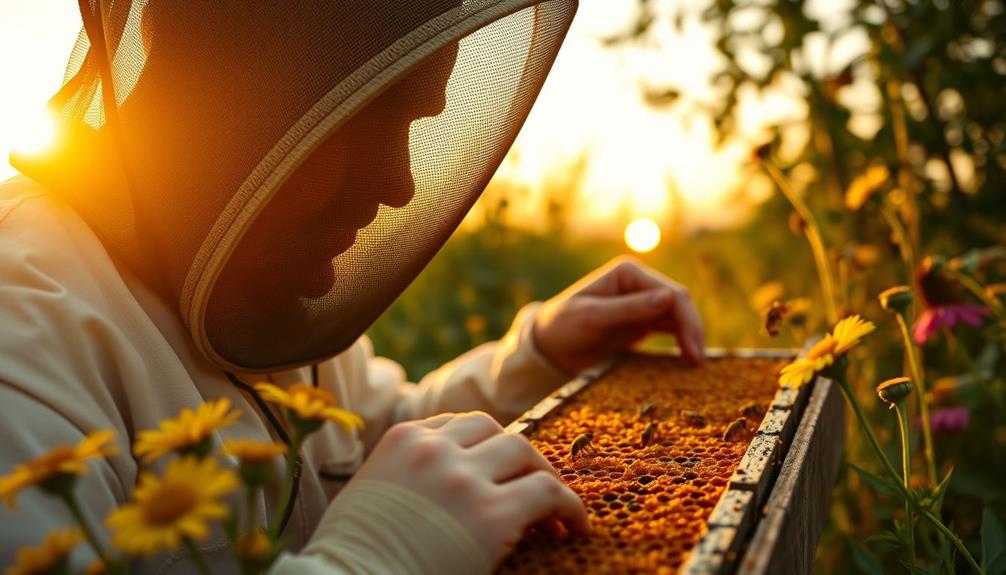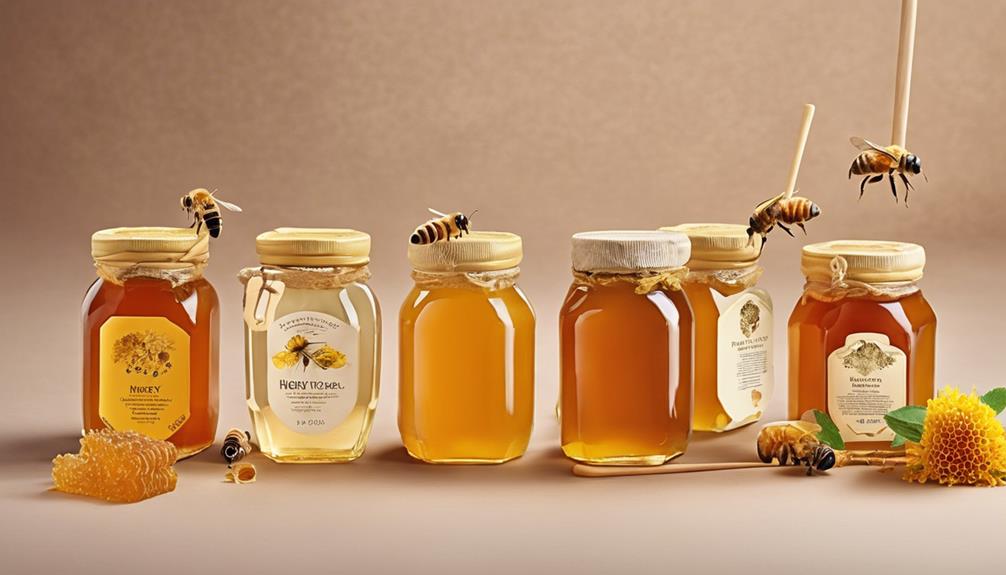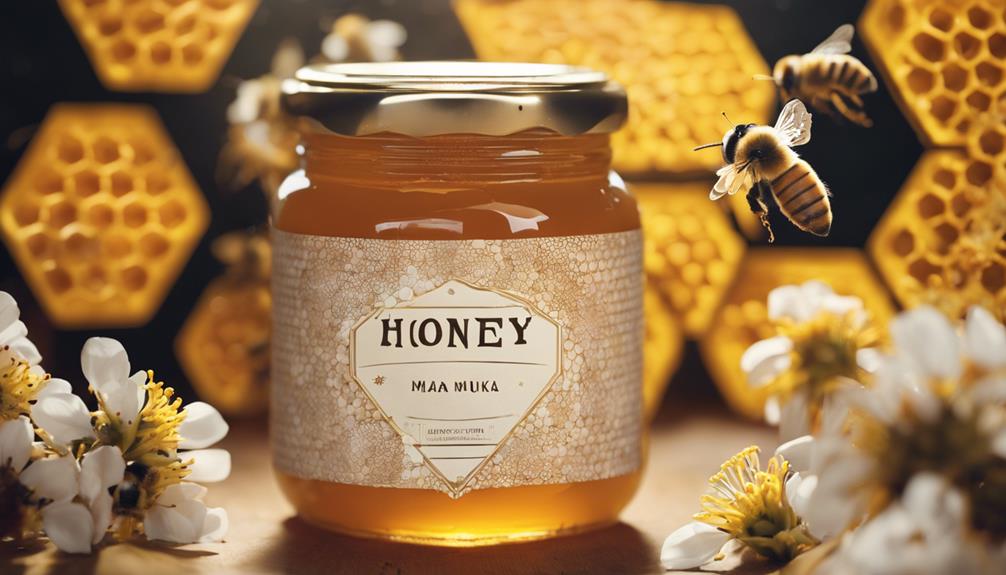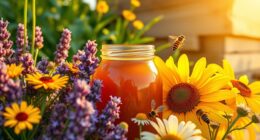Establishing a honey producers' cooperative through cooperative beekeeping can greatly boost your income and the health of your local ecosystem. By pooling resources, you gain access to marketing platforms, certified bottling, and valuable advice from experienced beekeepers. This collaboration leads to emotional support and innovative practices that promote responsible beekeeping, ensuring healthier bee colonies. Working together, you can strengthen local biodiversity while enhancing your community's pollination efforts. Plus, with steady sales and shared knowledge, you secure financial stability. Stick around, and you'll discover more about turning this vision into reality.
Key Takeaways
- Establishing a honey producers' cooperative fosters resource sharing and enhances the efficiency of beekeeping practices among members.
- Cooperatives provide access to certified bottling, marketing services, and shared platforms, improving product credibility and market reach.
- Backing from associations like the German Beekeepers' Association helps stabilize prices and builds buyer trust for cooperative-produced honey.
- Collaborating within a cooperative promotes responsible beekeeping practices, ensuring healthier bee colonies and contributing to local biodiversity.
- Engaging in local community initiatives raises awareness about bee conservation and the importance of cooperative beekeeping for ecosystem health.
Importance of Bees
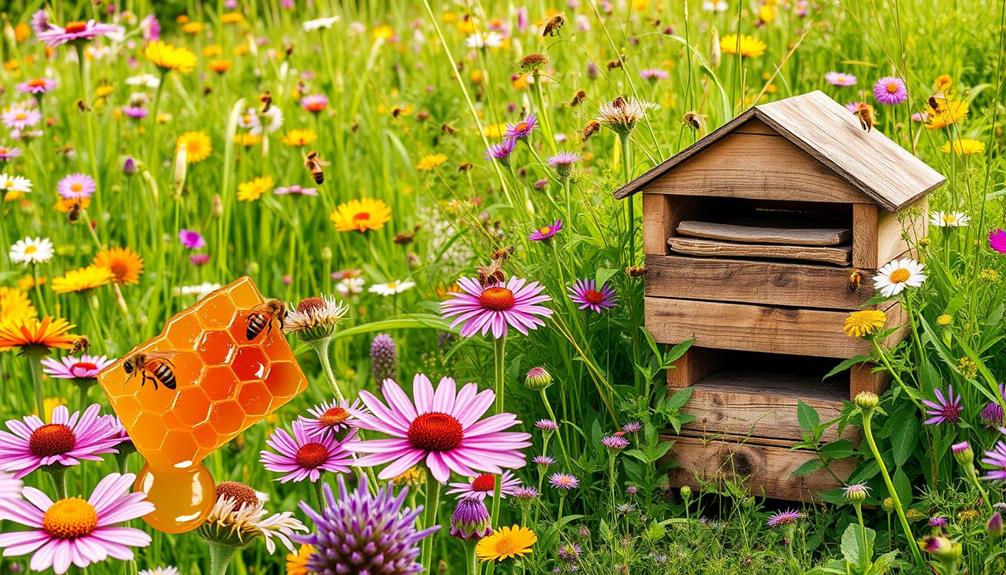
Bees play an essential role in our ecosystem, with about three-quarters of European food production relying on their pollination efforts. You mightn't realize it, but these tiny insects are imperative for maintaining the biodiversity we depend on.
In Germany, for instance, a staggering 85% of agricultural yields hinge on honeybee pollination. This highlights just how important bees are for food security in your region. Additionally, the honey produced by various bee species, such as the Western Honey Bee, contributes considerably to local economies and culinary traditions, showcasing their fascinating facts about stingless bees.
Every year, you consume around 1 kg of honey, which not only adds sweetness to your life but also underscores the cultural and economic significance of bees and their products.
As awareness grows about the decline in bee populations, many are stepping up to support cooperative beekeeping efforts. These initiatives promote sustainable practices that enhance bee health and guarantee their survival.
The connection between bee health and regional agricultural productivity is undeniable. Responsible beekeeping is essential for maintaining ecological balance, which ultimately benefits everyone.
Benefits of Cooperatives
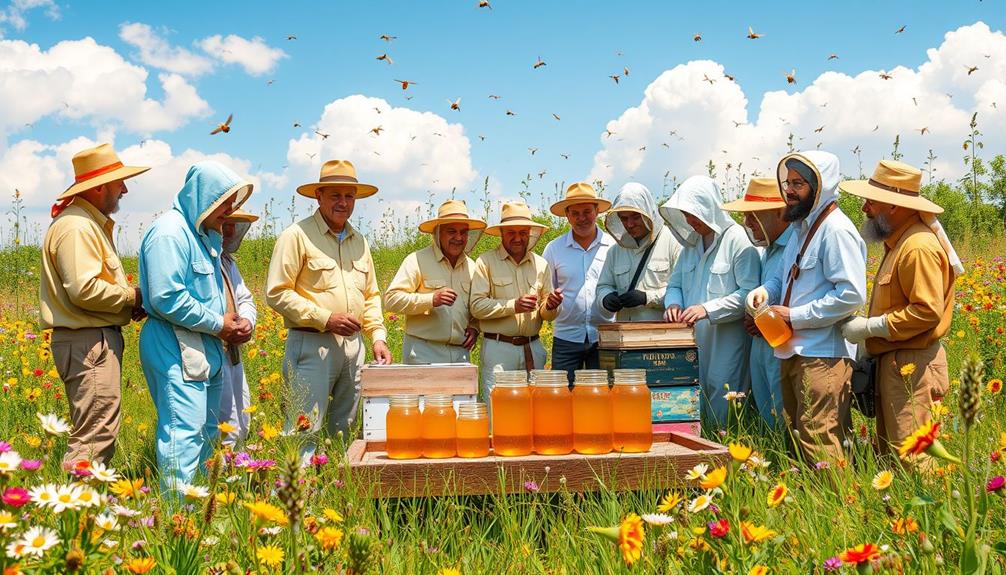
As awareness of bee population decline grows, many are turning to cooperative beekeeping as a practical solution. Joining a cooperative gives you access to shared marketing platforms and resources, enhancing your ability to sell honey and bee products effectively.
With the backing of the German Beekeepers' Association's quality standards, you can build buyer trust and stabilize prices for your fluctuating natural products. Additionally, the cooperative approach promotes key domains of development in psychology, fostering emotional and social growth among beekeepers as they collaborate and share experiences.
Whether you're a professional or hobbyist beekeeper, cooperatives guarantee honey sales, supporting local biodiversity through increased pollination efforts. By participating, you can also access certified bottling and marketing services, streamlining your operations and reducing the administrative burden that often accompanies beekeeping.
The cooperative model fosters collaboration among beekeepers, which leads to improved sustainability practices. You'll find that working together strengthens your community network, allowing you to share knowledge and resources more effectively.
This collective approach not only benefits individual members but also contributes to the overall health of bee populations and the environment. Embracing cooperative beekeeping can transform the way you manage your hives and market your products, ensuring a more sustainable future for both your business and the bees.
Supporting Local Beekeeping
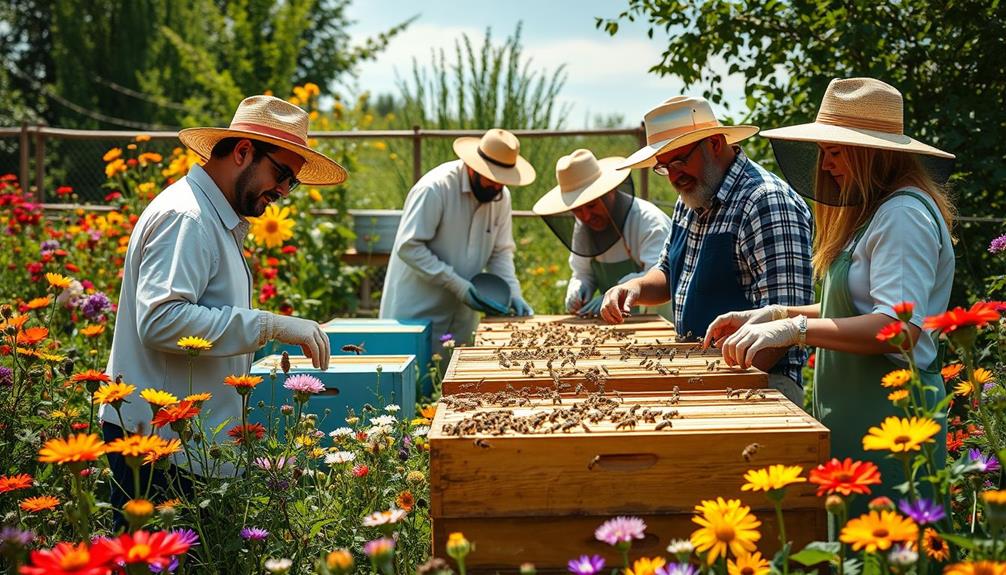
Supporting local beekeeping through cooperatives can greatly boost your honey sales and access to markets.
By joining forces, you not only enhance your income stability but also contribute to local biodiversity, which benefits the entire ecosystem.
Collaborating with other beekeepers can also provide opportunities to share resources and knowledge, enhancing your coffee brewing experience and expanding your product offerings.
Together, you and your fellow beekeepers can create a thriving environment for bees and improve pollination efforts in your community.
Benefits of Cooperative Structure
Joining a cooperative structure offers numerous advantages for both professional and hobbyist beekeepers. By working together, you can sell honey at market prices, which guarantees financial stability and assures sales for your products.
This collaborative approach allows you to pool resources, giving you access to shared marketing platforms and certified bottling services. As a result, your products gain visibility, and consumer trust increases.
Being part of a cooperative encourages responsible beekeeping practices, which can lead to healthier bee colonies and a positive impact on local ecosystems. You'll also benefit from reduced travel times and costs when procuring beekeeping supplies.
On-site advice from experienced members can enhance your beekeeping techniques and overall productivity.
Moreover, cooperation among beekeepers promotes sustainability and strengthens community support. You'll find that working together aligns with environmental advocacy, creating a more resilient network to tackle challenges like climate change.
Enhancing Local Biodiversity
Cooperative beekeeping plays an important role in enhancing local biodiversity by bolstering pollination efforts across ecosystems. By supporting local beekeeping through cooperatives, you contribute to improved ecosystem health and increased biodiversity. As bee colonies thrive within these cooperatives, they stabilize food production systems, critically pollinating around three-quarters of European food crops.
Participating in beekeeping cooperatives encourages responsible practices among both hobbyist and professional beekeepers. This commitment to sustainability guarantees that bee populations and their habitats remain intact, fostering a healthier environment.
Additionally, enhanced collaboration among local beekeepers sparks innovation in sustainable practices that directly benefit biodiversity and ecological balance.
Engaging in cooperative beekeeping initiatives also empowers you and your community to advocate for environmental protection. By supporting responsible beekeeping, you help preserve local flora and fauna, creating a thriving ecosystem.
Together, you and your fellow beekeepers can make a significant impact, guaranteeing that both bees and the biodiversity they support flourish. So, as you immerse yourself in cooperative beekeeping, remember that your efforts are essential in sustaining the delicate balance of nature.
Sustainable Practices in Retail
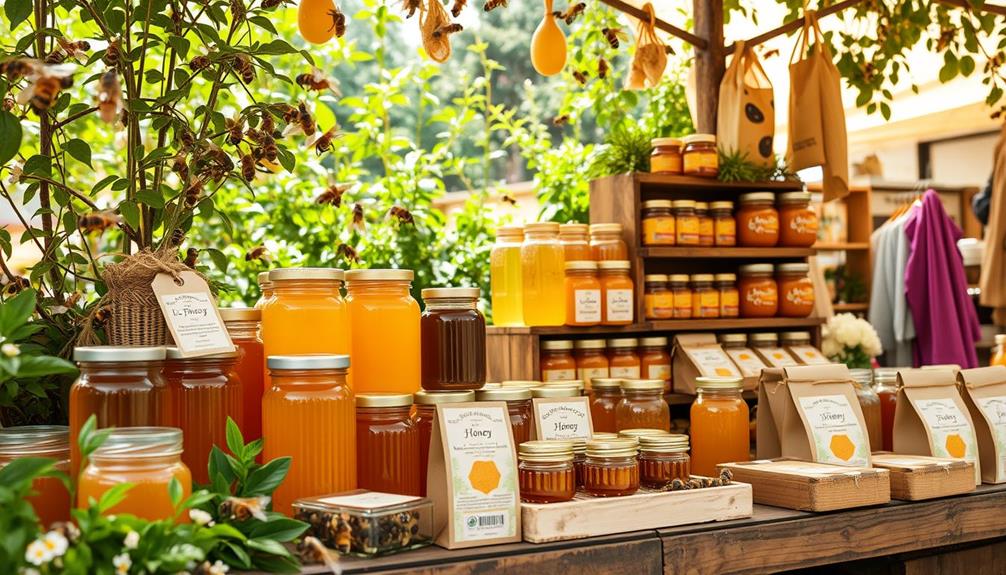
In today's market, sustainable practices in retail are more critical than ever, especially for products like honey and other bee-based goods. By utilizing the cooperative model, you can guarantee stable pricing and availability of these products, even amid fluctuating natural product markets. This consistency not only benefits retailers but also fosters consumer trust.
As a member of a beekeeping cooperative, you gain access to certified bottling and marketing services that comply with quality standards. This enhances your product's credibility and promotes responsible sourcing, which consumers increasingly demand.
Plus, cooperatives offer shared marketing platforms that help you reach new sales channels while supporting local beekeepers. Selling sustainably produced bee-based products like mead and cosmetics encourages responsible consumption among your customers.
The cooperative structure empowers you to promote these goods effectively. Additionally, by providing beekeeping supplies and on-site advice to non-members, cooperatives contribute to a sustainable retail environment that supports both established and new beekeepers in the community.
Community Engagement Initiatives
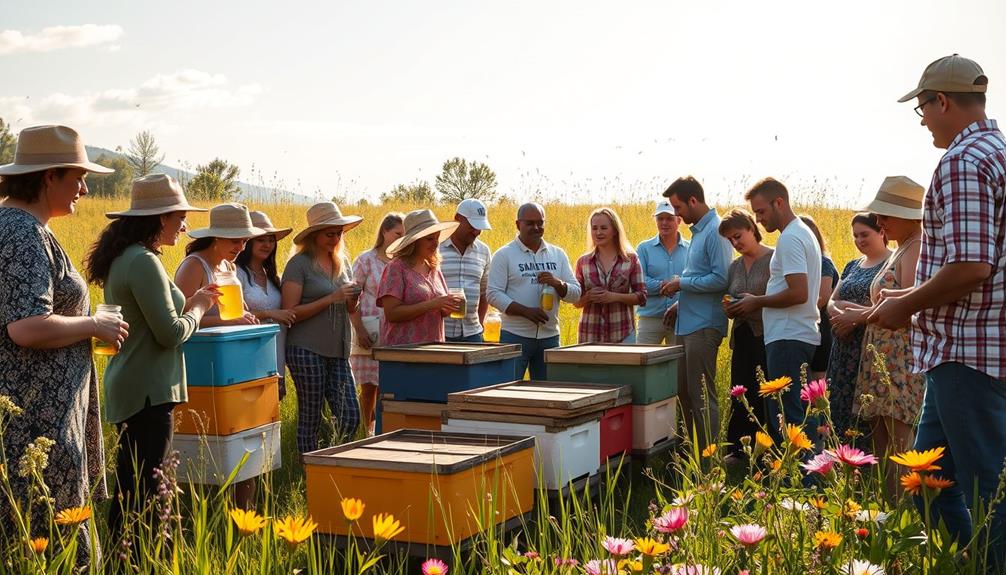
You can make a difference through local education programs that raise awareness about bees and their essential role in our ecosystems.
Volunteer opportunities are available for you to get hands-on experience and contribute to environmental awareness campaigns.
Local Education Programs
While many people may not realize it, local education programs play an essential role in fostering awareness about the importance of bees in our ecosystems and agriculture. These programs emphasize bees' crucial contribution to biodiversity and food security, making it clear why every community should care.
You can get involved in workshops and training sessions that promote sustainable beekeeping practices. These hands-on experiences often include beekeeping demonstrations, where you can learn about honey production and how to manage bee health effectively. By participating, you not only gain valuable knowledge but also help spread the word about the significance of bees.
Collaboration with schools and local organizations amplifies these efforts, ensuring that the information reaches a broader audience. This outreach fosters a sense of responsibility towards environmental stewardship, encouraging everyone to take part in protecting these essential pollinators.
Ultimately, these initiatives aim to strengthen the relationship between beekeepers and the community, creating a supportive network that enhances local biodiversity.
Volunteer Opportunities Available
Volunteer opportunities in beekeeping cooperatives offer a unique chance to immerse yourself in honey production and sustainable practices while supporting local biodiversity. By getting involved, you not only learn about beekeeping but also contribute to essential community initiatives.
Here are some rewarding ways you can engage:
- Assist in Honey Production: Get hands-on experience by helping with hive maintenance, learning the intricate processes of honey extraction, and understanding the role of bees in our ecosystem.
- Participate in Educational Programs: Help educate others about the significance of bees in food production and biodiversity, making a lasting impact on community awareness.
- Join Training Sessions: Broaden your knowledge of sustainable beekeeping practices through workshops, ensuring you're well-informed about ecological impacts and techniques.
- Build a Sense of Community: Connect with fellow enthusiasts and local agricultural efforts, fostering friendships and a shared passion for promoting healthy ecosystems.
Environmental Awareness Campaigns
Environmental awareness campaigns play an essential role in fostering community engagement and promoting sustainable beekeeping practices. By participating in educational programs about the role of bees in ecosystems, you can help raise awareness of biodiversity and the importance of sustainable beekeeping. Projects like "Bees hum for the Volksbank" encourage local involvement, strengthening community ties through hands-on beekeeping experiences.
These campaigns often emphasize the impact of bee population decline on agricultural productivity. They highlight the need for cooperative efforts to maintain healthy bee populations. Collaborative initiatives, supported by local funding like "Leader Heckengäu," aim to enhance biodiversity through responsible beekeeping and community involvement.
Here's a quick overview of some key aspects of these campaigns:
| Initiative | Focus | Community Benefit |
|---|---|---|
| Bees hum for the Volksbank | Practical beekeeping experiences | Strengthens community ties |
| Educational programs | Role of bees in ecosystems | Raises awareness of biodiversity |
| Leader Heckengäu | Enhancing biodiversity | Promotes responsible beekeeping |
Growth of Beekeeping Cooperatives
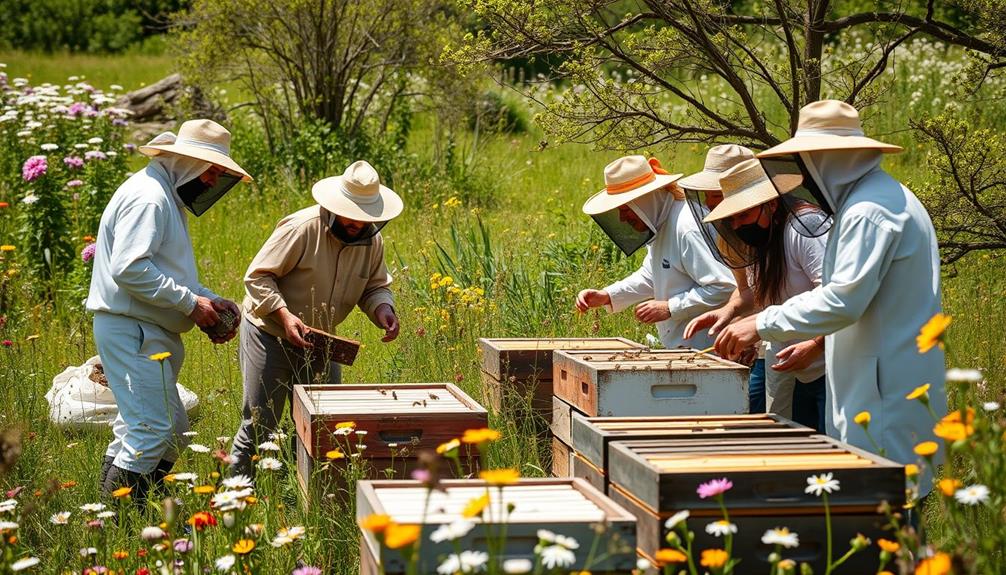
Beekeeping cooperatives are on the rise in Germany, driven by beekeepers joining forces to share resources and market their honey more effectively.
This collaboration allows you to focus on what you love—beekeeping—while reducing the burdens of side work. With domestic honey demand exceeding supply by five times, the urgency for cooperative growth has never been clearer.
Here's why you should consider joining a cooperative:
- Shared Resources: Pooling equipment and knowledge means you don't have to go it alone.
- Local Distribution: Cooperatives like Teutoburger Wald successfully supply 17 local markets, enhancing your market reach.
- Community Support: With around 100,000 beekeepers in Germany, you'll be part of a vibrant network that fosters sustainability.
- Proven Success: The Süddeutsche Beekeeping Cooperative, with 1,200 members, exemplifies how cooperation leads to growth and support.
As you explore options for enhancing your beekeeping journey, consider how joining a cooperative can elevate your efforts, enabling you to thrive in a challenging market.
The future of your honey production could very well depend on it!
Ecological Partnerships and Projects
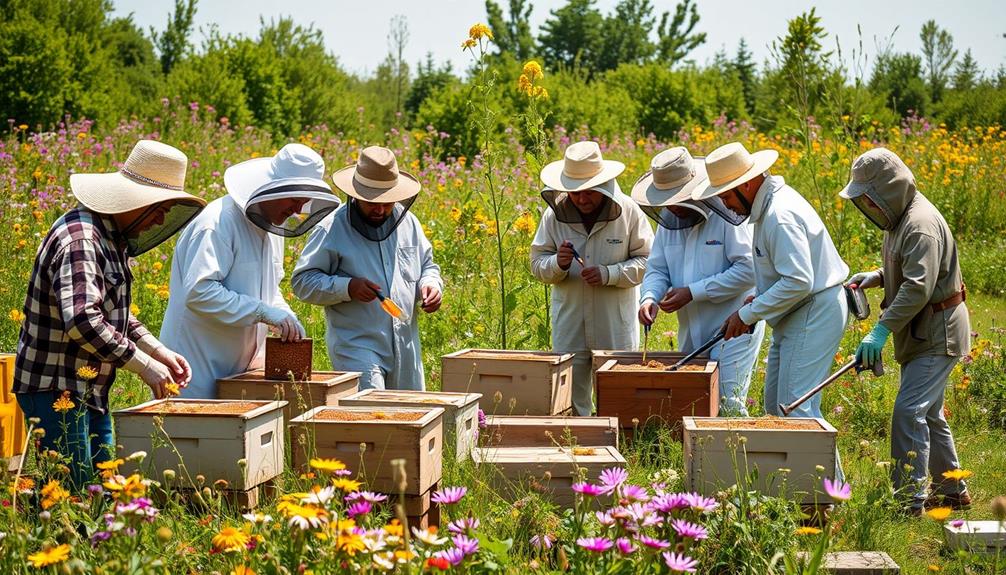
In a world increasingly aware of ecological challenges, partnerships between beekeepers and local communities are forging a path toward sustainable practices. One notable collaboration involves local beekeeper Peter Brenner, who, with support from "Leader Heckengäu" funding, is enhancing biodiversity through sustainable beekeeping.
The initiative, titled "Bees hum for the Volksbank," introduced around 80,000 bees to produce honey while raising community awareness about the ecological importance of bees. Regular monitoring and management of these bee colonies guarantee their health and productivity, contributing directly to local environmental sustainability.
The project's first honey harvest in autumn 2021 emphasized quality and sustainability, reinforcing community ties and supporting local agriculture. Community engagement efforts play an essential role, as they aim to educate residents about the significant role bees play in ecosystems.
You're encouraged to participate in these sustainability initiatives, fostering a deeper connection to your environment. By working together, you and your neighbors can help promote practices that not only benefit the bees but also enhance the overall health of your local ecosystem.
This partnership exemplifies how collective efforts can lead to positive ecological outcomes.
Products and Services Offered
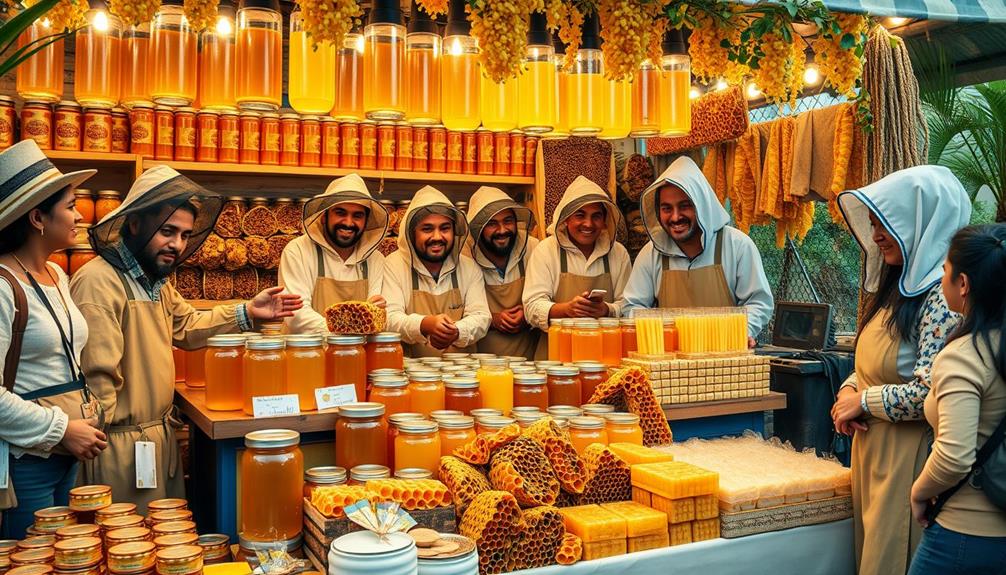
Collaborative efforts in sustainable practices naturally lead to an array of products and services that enhance both the beekeeping experience and the community's connection to bees.
At our cooperative, you'll discover high-quality honey varieties like rapeseed honey, flower honey, and forest honey, all available in convenient sizes of 12.5kg, 25kg, or 40kg.
As a member, you can sell your honey through our shared marketing platform and access specialized bottling services, making it easier than ever to thrive in this industry.
But that's not all; we also provide essential supplies and products, including:
- VarroMed treatment for Varroa mites to keep your colonies healthy.
- A selection of honey jars for all your packaging needs.
- Beekeeping consultations tailored to your unique challenges.
- Training sessions and health assessments to support your bees' well-being.
With our online shop, you can easily order supplies, enjoying free shipping on orders over €200 (excluding bulky goods).
Join us in fostering a vibrant, sustainable beekeeping community while securing the future of our pollinators!
Frequently Asked Questions
When Do I, as a Beekeeper, Need to Register a Business?
As a beekeeper, you need to register your business if your honey production exceeds 2,500 kg annually, if you sell beyond local markets, or if you create value-added products. Compliance with regulations is essential.
Is Beekeeping Tax-Free?
Beekeeping isn't entirely tax-free. If your honey sales stay below €22,000 annually, you might avoid income tax and VAT. However, exceeding that threshold means you'll need to follow standard tax regulations and file returns.
When Can I Call Myself a Beekeeping?
You can call yourself a beekeeper once you establish an active bee colony and manage its health. Engaging in educational courses and community activities further solidifies your identity and enhances your credibility in beekeeping.
How Can I Sell My Honey?
Selling your honey's like sharing a piece of your heart. You can join a cooperative, tap into new markets, and enjoy shared resources, ensuring your sweet creation finds its way to enthusiastic customers craving local flavors.
Conclusion
In the grand scheme of things, who knew bees could inspire such a buzz about cooperation? By joining forces in a honey producers' cooperative, you're not just saving the planet one jar at a time; you're also crafting a sweet alternative to corporate greed. So, while the big shots chase profits, you'll be busy cultivating community, sustainability, and a love for those tiny pollinators. After all, if bees can work together, surely we can figure out how to share a little honey, right?

